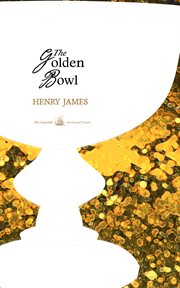Fiction
eBook
Details
PUBLISHED
Made available through hoopla
DESCRIPTION
1 online resource
ISBN/ISSN
LANGUAGE
NOTES
The Golden Bowl comes in the first years of the 20th-century: the publisher, Charles Scribner's Sons, decided never to serialise it and published it in New York in December 1904 in two volumes. After just a few months, in February 1905, also Methuen published the novel in London in a one-volume edition. In 1909, a revised edition appeared as volumes 23 and 24 of the New York edition, and James this time also prepared the preface, in which he reflected on The Art of Fiction. He says: "A novel is a living thing, all one and continuous, like every other organism, and in proportion as it lives will it be found, I think, that in each of the parts there is something of each of the other parts." James', The Golden Bowl, provides a supreme example of this kind of "living thing" and a literary texture of staggering complexity and richness, we find just in masterpieces and addresses James's essential theme, the meeting of two great cultures, European and American. James took the title of the novel from Ecclesiastes 12:6-7: «Or ever the silver cord be loosed, or the golden bowl be broken, or the pitcher be broken at the fountain, or the wheel broken at the cistern… then shall the dust return to the earth as it was…», and opens with a Prince, Prince Amerigo, a charming Italian nobleman of reduced means, in London for his marriage to the wealthy Maggie Verver, the only child of the widower Adam Verver, an American financier and art connoisseur. Mixed in the plot also a short story Henry James wrote in 1891 The Marriages, in which a father and daughter remain hopelessly caught up in "a mutual passion, and intrigue," a complex tale of treachery and betrayal, another "must" for James. James dictated the text of the novel every morning to a typist for one year because he suffered from writer's cramp. The narrative is fantastic, but often also claustrophobic and terrifying, James plays with the emotions, and the dominant theme remains Maggie Verver's subtle resolution despite an impossible and perhaps dreadful situation. She finds her "happy end," when she saves her marriage, and her father prepares to return to America, leaving her reconciled to her husband
Mode of access: World Wide Web







